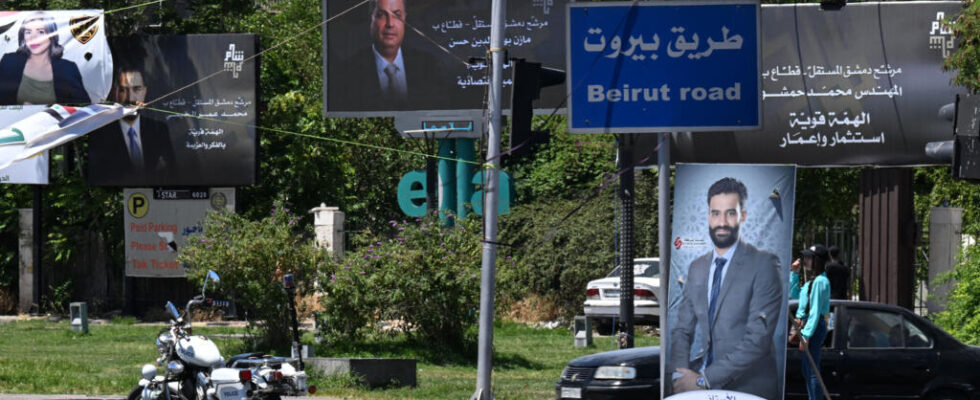Syrian voters are called to elect their deputies to the Majlis Al-Shaab, the Syrian Parliament, on Monday, July 15. This is the fourth election of its kind since the start of the civil war in 2011. It is systematically dominated by the ruling Baath Party. Elections without much suspense, therefore, but which allow us to become aware of the fragmentation of the country after more than a decade of war.
4 min
The vote organized by the authorities in Damascus will only take place on a portion of Syrian territory. Since the Bashar al-Assad regime only controls 70% of the country.
In the northeast, vast areas are administered by the semi-autonomous Kurdish authorities. In the northwest, the Idlib region, which has shrunk to nothing under the offensives of the Syrian army and its Russian ally, is under the control of the Islamist group Hayat Tahrir al-Sham. And finally, in the north of the country, armed groups close to the Türkiye have control over a small border territory.
Even within the territory controlled by the Damascus regime, the announcement of these elections has rekindled the protest movement in the south, in the Druze town of Suweida, which is standing up to the government of Bashar al-Assad and has announced that it will boycott the vote. For its part, the Syrian opposition in exile has denounced the elections as “ absurd ” Who “ only represent the authority in power “.
It must be remembered that in 2020, during the last legislative election, only 33% of Syrians went to the polls, almost half as many as in 2016. And then, these elections will take place without the votes of the more than 5 million Syrian refugees, deprived of their right to vote, after fleeing their country in the grip of an endless war and the violence of the Bashar al-Assad regime.
2024, a year of the “crisis of governance”
The vote is expected to strengthen the president’s Baath party. Bashar al-Assad. But it also highlights the fragmentation of the country. Municipal elections were even organized by the Islamist party Hayat Tahrir al-Sham (HTS) in power in the Idlib region. In the northeast, the Kurdish authorities are also trying to organize their municipal elections with the aim of ratifying a new constitution.
For Arthur Quesnay, a political science researcher affiliated with the Sorbonne, contacted by telephone from Raqqa by Oriane Verdier from RFI’s international service, ” The year 2024 is that of a crisis of governance throughout Syria, that is to say the regime side in the areas held by HTS in Idlib, and even in the areas of northeastern Syria managed by Kurdish forces. A crisis of legitimacy that forces these three different actors to resort to the ballot box to try to restore their image and regain credibility in the eyes of the population by engaging local actors, by making them fit somewhere into their own system. »
Arthur Quesnay adds: “ We are faced with three completely different administrative systems and what we are seeing in Syria is a war of attrition between the three zones. “, he notes, “ The Syrian state is in a catastrophic state. Salaries are almost no longer paid. The state is in full fragmentation while in the opposition areas – either HTS or the Kurdish areas in northeastern Syria – both groups manage to administer their populations rather better than in the regime areas. »
Read alsoSyria: Thirteen years after the start of the war, “there is no more hope, there is no more country”
A failed attempt at normalization
These elections are a way of legitimizing Bashar al-Assad while the attempt to normalize the Syria with other countries in the region is a failure.
” The regime is trying to normalize itself. Arab League reintroduced it but it was above all an attempt at normalization initiated by Saudi Arabia which was trying to take a little lead in the Arab world “, points out Arthur Quesnay. ” In reality, this normalization has gone nowhere. The regime has not made any concessions and remains on its extremely hard positions compared to other countries in the region. The regime is holding on thanks to Russian and Iranian military aid. The Iranians have reformatted the entire security system of the Syrian regime which is now in a strategic policy of privatization of the economy, water, electricity, all sectors of the Syrian state.. »
Then Arthur Quesnay continues: “ In this way, in fact, if the Syrian state collapses, the regime manages to maintain itself, that is to say the clique in power with security forces that patrol the territory, push the population to leave, and finally with this policy of the worst the regime manages willingly or unwillingly to hold on, a bit like the regime of Saddam Hussein held on from 1991 despite the embargo that lasted on Iraq until 2003.. »
Read alsoTürkiye: Erdogan ready to invite his Syrian counterpart Bashar al-Assad “at any time”
